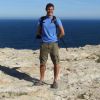
Professor Mark Smith
- Position: Professor of Water Science & Health
- Areas of expertise: rivers; floods; malaria; health; geomorphology; hydrology; glaciers; surveying
- Email: M.W.Smith@leeds.ac.uk
- Phone: +44(0)113 343 1974
- Location: 10.36 Garstang Building
- Website: Bluesky | Googlescholar | ORCID
Profile
I am Professor of Water Science & Health, with a general interest in the interface between hydrology and geomorphology and human health and well-being. My more specific research areas include the impact of water flows and earth surface processes on malaria transmission, healthcare access and flood risk. I work in a variety of environmental settings both in the UK and overseas. My current work examines the effect of hydrological processes and flooding in major African river systems on malaria transmission at both the catchment and continental scale. This includes the recent NERC FLOODMAL project, investigating hydrological and geomorphological drivers of malaria transmission in the Barotse wetlands of the Zambezi River in Zambia (NE/P013481/1) and a CIHR project looking at environmental and social drivers of healthcare access on the same floodplain. I am currently PI on a NERC-funded project (Still Waters, UKRI2659), working with the Zambian Ministry of Health to embed hydrology into models of malaria transmission and in turn, target and tailor interventions.
In the UK, I am focused on better understanding the operation and benefits of Natural Flood Management techniques (from Large Woody Dams and beaver releases to peatland restoration) and consequences of other events (e.g. gravel mining, UK peatland wildfires) for flooding, water and sediment transport. I am currently Co-I on a NERC Engaged Environmental Science project (CONVERSE), helping facilitate community-led monitoring of NFM structures in Liverpool.
Responsibilities
- River Basin Processes & Management Research Cluster Leader
- Year in Industry Tutor
Research interests
I am a geomorphologist and hydrologist with a general interest in earth surface forms and processes, applied to a range of environments. In particular, I have an interest in the relationship between hydrological processes and flooding in major African river systems and malaria transmission at both the catchment and continental scale. More generally, I am interested in methods of surveying and parameterising numerically complex topographies both as part of hydraulic modelling and more generally within geomorphology, especially with a view to conducting spatially-distributed morphometric sediment budgets. As such, my research takes place at the interface between fieldwork and modelling. I have extensive experience in the logistics of managing and conducting fieldwork in remote and challenging environments.
In the UK, I apply these survey and modelling methods to address a number of management issues, from investigating upland peat erosion due to wildfires, to examining evidence that Natural Flood Management interventions reduce downstream flood peaks, to better parameterising roughness-resistance relationships in marginally-inundated gravel bed rivers, to examining the effects of Large Woody Dams on flow resistance and sediment transport, and to investigating the hydraulic and geomorphological effect of beavers.
In addition, I have applied my interests in topographic survey and parameterisation of surface roughness to investigate surface melt processes on arctic, Alpine and tropical glaciers and ice caps. This includes examining melt rates on ice surfaces and calving fronts and parameterising aerodynamic roughness height of melting ice with a view to upscaling for spatially distributed melt modelling.
Masters by Research and PhD Supervision
I have been the joint or lead supervisor of eight Masters by Research students, 20 PhD students, and three post-doctoral researchers. I welcome Masters by Research and PhD applications in the following general areas:
- River hydraulics: Floodplain inundation of major African rivers and the impacts on malaria transmission
- NFM: Evaluating the effectiveness of Natural Flood Management techniques
- Glacier surveys: Parameterising aerodynamic roughness of glacier surface ice for distributed melt modelling
- Erosion: Quantifying erosion and deposition processes morphometrically using high resolution surveys
Co-investigator (Co-I)
Qualifications
- 2009 Ph.D. Overland flow resistance and flood generation in semi-arid environments. Uni of Durham
- 2005 MSc.R. Department of Geography, University of Durham
- 2004 BSc Geography, University of Durham
Professional memberships
- British Society for Geomorphology
Student education
I teach on the geomorphology-theme within the BSc Geography degree, covering modules across all three years. This includes general lectures on hydrology, hydraulics and sediment transport at Level 1, more quantitative treatments of these same topics at Level 2 and then a specialist course on Hydrological Monitoring and Modelling at Level 3. These classes cover field techniques, laboratory and computer practicals. I am also a tutor and dissertation supervisor.
I co-ordinate and lead the Portugal Fieldclass at Level 2 where we investigate dryland runoff processes and river management, beach hydrology and the impact of microplastics, wetland sedimentology and tsunami deposits and rock cliff stability.
I am also the Academic Employability Lead for the School of Geography and act as Year in Industry tutor. I find that visiting our students during their Year in Industry is one of the most rewarding aspects of my job.
Research groups and institutes
- River Basin Processes and Management

